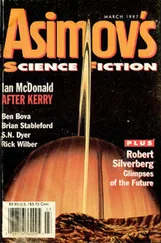“If your computerized buddies hadn’t gone prying,” she said, “we wouldn’t be in this mess.” She was still nursing aggressive feelings towards poor Myrlin.
“They wouldn’t have embarked upon that kind of exploration if it hadn’t been for what they learned from us,” he answered mildly. “And I wouldn’t have attracted their attention by buggering up one of their systems if you hadn’t been chasing me with murderous intent.”
“So it’s all my fault?” she said. Her voice was still cutting, but I thought that she had some appreciation of the irony of the situation.
“No,” I said. “You explained it to me before, remember? It’s all my fault, for not taking Myrlin in and keeping him safe until your assassination squad arrived. I suffered a momentary lapse of generosity, and the consequences of my churlishness have imperiled the whole bloody universe. Lack of charity is a terrible thing, don’t you think?”
“Well,” she said, “I’ll say one thing for you, Rousseau. Things are never dull when you’re around.”
“Not my fault,” I assured her. “Just lucky enough to be living in interesting times.”
The wall behind her suddenly lit up, presenting the appearance of another room, with that same silly chair and that same impeccable goddess. She was back in her thin dress, but I didn’t ask her to change it. One Star Force colonel at a time was quite enough for me.
Her face was not shaped to show anxiety or stress. Indeed, it radiated imperturbability. I wasn’t sure whether that meant that everything was under control, or whether things were so awful that the Nine didn’t dare to let on.
“I will try to get a vehicle to you in a short time,” she said. “I am sorry that it has taken so long.”
“Have you zapped all the mantises?” I asked.
“The robot invaders have all been disabled or sealed in,” she said. “Many systems are still non-functional, and the damage is severe, but the situation is now stable.”
“We can’t rely on it remaining stable,” I said. “We’ve got to get ready to make our bid for the Centre as soon as possible. We can’t just hang around, getting battered by one attack after another.”
“I agree, Mr. Rousseau,” she said, with a little smile that I didn’t entirely like. “We must waste no more time before making a serious attempt to find out precisely what is going on in the deeper levels, and how we can rectify the situation. The power-supply must be restored, and the hostile force which is attempting to destroy us must be neutralised.”
“Is the robot transporter safe?” asked Myrlin. He meant the one that the Nine had been building for our journey to the Centre. If we’d lost that, we might not have any alternative but to sit tight and wait for the next attack.
“It is safe,” replied the Nine, “but it may be irrelevant. There is another way to make the attempt to reach the Centre, and this attack leads us to believe that we must attempt both, as soon as we possibly can.”
My first thought was that they meant the deep elevator shaft which had brought us down from level fifty-two. It wasn’t much use for our purposes, partly because it didn’t go down much further, and partly because it wasn’t big enough to carry a heavy armoured vehicle. But then I realised that without the central power-supply, the elevator wouldn’t work. I also realised that without the central power-supply to open doors and activate other elevators, it was going to be a very tough job getting a truck down into the bowels of the macroworld—even if we could discover a route.
“What better way?” Myrlin had asked, while I was realising all that.
“Through software space,” she replied.
“You already tried that,” I pointed out, “and were nearly destroyed. Besides, we can’t go through software space, can we?” It occurred to me even as I was saying it that it might be an unwise remark.
“Yes you can, Mr. Rousseau,” she told me. “And if our present understanding of the situation is correct, we think that the entity which has made contact with you intends that you should.”
Ever since humans first began building so-called artificial intelligences, people had looked forward to the day when it would be possible to duplicate a human mind in machine-based software. In the home system, our software scientists had not yet come close to the skill and sophistication that would be necessary to carry out such a task, but other races in the galactic community had got closer—the manufacture of Myrlin’s personality by the relatively unsophisticated Salamandrans was a pointer to the possibility that such play with artificial minds was only just over the conceptual horizon. The Nine had begun their own existence as simulations of the personalities of another kind of Isthomi, incarnate in flesh very little different from mine. The entity which had contacted me while I was interfaced with the Isthomi had, it seemed, made some kind of biocopy of its own programming to colonise the software space inside my brain. The Isthomi had made similar biocopies of themselves in order to equip the fleshly scions which they had made. If that could be done, so could the reverse process: the Isthomi could make a machine-code copy of my personality within their own systems, including the extra software that the contact had foisted on me.
It was only natural, I realised, that the Nine had jumped to a conclusion which hadn’t even occurred to me—that when my mysterious contactees had cried for help, they had expected that help to come through software space, not through the cracks and crevices of Asgard’s massive macroarchitecture.
I was by no means convinced that it was a good idea.
“You want to make a copy of me,” I said. “And send that copy out into software space to run the gauntlet of whatever it was that blasted you when you tried to reach the Centre.”
“We have reasons for thinking that you might be able to succeed,” she assured me.
“Maybe so,” I said. “But I’m not so sure that I want to send a software copy of myself to the Centre. In fact, I’m not so sure that I want any software copies of me hanging about anywhere. You might have got used to being nine persons in one, but I’m accustomed to there being just one of me. I think I told you that I’m an essentially solitary person. I really wouldn’t like to have to use numbers to distinguish each of my particular selves from all the other ones. It just isn’t my style.”
“Why do you think that Rousseau might succeed where you failed?” asked Susarma Lear, cutting through my objections as though they didn’t much matter. I had a nasty suspicion that they didn’t.
“We are now forewarned of the dangers and difficulties,” replied the image in the wall. “We believe that we can now make software personas far less vulnerable to destruction than the exploratory probes which we have previously sent out. Such personas can be encrypted, written in an arcane language.”
“What’s an arcane language?” I asked, feeling slightly foolish.
But Susarma Lear was nodding, as though she understood. “It’s what the Star Force—and everyone else—uses to protect its systems from hostile software,” she said, airily. You can never be absolutely certain that you can keep tapeworms out of your machinery, so you have to make sure that the damage they do to your software once they’re there is strictly limited. What you do is to keep your own information in a special code—an arcane language— which is immune to the spoiling that the tapeworm tries to do. If you’re clever enough, the invader programme is unable to crash your system or bugger up your data. Right?”
She had turned to look at me, but now she turned back to face the avatar of Athene who looked, in some ways, uncannily like her. I had never thought of Susarma Lear as a dead ringer for Athene; personally, I thought that she was infinitely more convincing as a valkyrie.
Читать дальше












